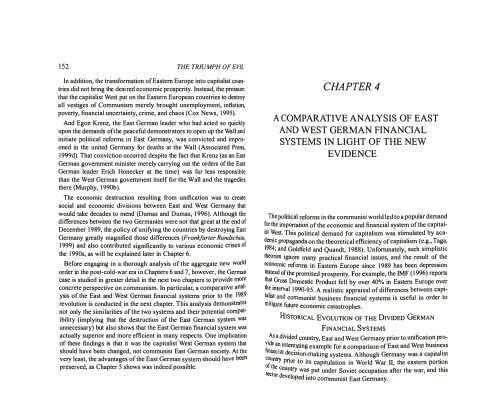austin-murphy-the-triumph-of-evil
austin-murphy-the-triumph-of-evil
austin-murphy-the-triumph-of-evil
Create successful ePaper yourself
Turn your PDF publications into a flip-book with our unique Google optimized e-Paper software.
152 THE TRIUMPH OF EVIL<br />
In addition, <strong>the</strong> transformation <strong>of</strong> Eastern Europe into capitalist countries<br />
did not bring <strong>the</strong> desired economic prosperity. Instead, <strong>the</strong> pressure<br />
that <strong>the</strong> capitalist West put on <strong>the</strong> Eastern European countries to destroy<br />
all vestiges <strong>of</strong> Communism merely brought unemployment, inflation,<br />
poverty, financial uncertainty, crime, and chaos (Cox News, 1995).<br />
And Egon Krenz, <strong>the</strong> East German leader who had acted so quickly<br />
upon <strong>the</strong> demands <strong>of</strong>t he peaceful demonstrators to open up <strong>the</strong> Wa ll and<br />
initiate political reforms in East Germany, was convicted and imprisoned<br />
in <strong>the</strong> united Germany fo r deaths at <strong>the</strong> Wall (Associated Press,<br />
1999d). That conviction occurred despite <strong>the</strong> fact that Krenz (as an East<br />
German government minister merely carrying out <strong>the</strong> orders <strong>of</strong> <strong>the</strong> East<br />
German leader Erich Honecker at <strong>the</strong> time) was far less responsible<br />
than <strong>the</strong> West German government itself for <strong>the</strong> Wall and <strong>the</strong> tragedies<br />
<strong>the</strong>re (Murphy, 1990b ).<br />
The economic destruction resulting from unification was to create<br />
social and economic divisions between East and West Germany that<br />
would take decades to mend (Dumas and Dumas, 1996). Although <strong>the</strong><br />
differences between <strong>the</strong> two Germanies were not that great at <strong>the</strong> end <strong>of</strong><br />
December 1989, <strong>the</strong> policy <strong>of</strong> unifying <strong>the</strong> countries by destroying East<br />
Germany greatly magnified those differences (Frankfurter Rundschau,<br />
1999) and also contributed significantly to various economic crises <strong>of</strong><br />
<strong>the</strong> 1990s, as will be explained later in Chapter 6.<br />
Before engaging in a thorough analysis <strong>of</strong> <strong>the</strong> aggregate new world<br />
order in <strong>the</strong> post-cold-war era in Chapters 6 and 7, however, <strong>the</strong> German<br />
case is studied in greater detail in <strong>the</strong> next two chapters to provide more<br />
concrete perspective on communism. In particular, a comparative analysis<br />
<strong>of</strong> <strong>the</strong> East and West German financial systems prior to <strong>the</strong> 1989<br />
revolution is conducted in <strong>the</strong> next chapter. This analysis demonstrates<br />
not only <strong>the</strong> similarities <strong>of</strong> <strong>the</strong> two systems and <strong>the</strong>ir potential compat·<br />
ibility (implying that <strong>the</strong> destruction <strong>of</strong> <strong>the</strong> . East German system was<br />
unnecessary) but also shows that <strong>the</strong> East German financial syst�m �as<br />
actually superior and more efficient in many respects. One implication<br />
<strong>of</strong> <strong>the</strong>se findings is that it was <strong>the</strong> capitalist West German system that<br />
should have been changed, not communist East German society. At <strong>the</strong><br />
very least, <strong>the</strong> advantages <strong>of</strong> <strong>the</strong> East German system should have been<br />
preserved, as Chapter 5 shows was indeed possible.<br />
CHAPTER4<br />
A COMPARATIVE ANALYSIS OF EAST<br />
AND WEST GERMAN FINANCIAL<br />
SYSTEMS IN LIGHT OF THE NEW<br />
EVIDENCE<br />
The political reforms in <strong>the</strong> communist world led to a popular demand<br />
for <strong>the</strong> importation <strong>of</strong><strong>the</strong> economic and financial system <strong>of</strong><strong>the</strong> capital<br />
ist West. This political demand for capitalism was stimulated by aca<br />
demic propaganda on <strong>the</strong> <strong>the</strong>oretical efficiency <strong>of</strong> capitalism (e.g., Taga,<br />
1984; and Goldfeld and Quandt, 1988). Unfortunately, such simplistic<br />
<strong>the</strong>ories ignore many practical financial issues, and <strong>the</strong> result <strong>of</strong> <strong>the</strong><br />
economic reforms in Eastern Europe since 1989 has been depression<br />
instead <strong>of</strong> <strong>the</strong> promised prosperity. For example, <strong>the</strong> IMF ( 1996) reports<br />
that Gross Domestic Product fe ll by over 40% in Eastern Europe over<br />
<strong>the</strong> interval l990-95. A realistic appraisal <strong>of</strong> differences between capi<br />
talist and communist business financial systems is useful in order to<br />
mitigate future economic catastrophes.<br />
HISTORICAL EVOLUTION OF THE DIVIDED GERMAN<br />
FINANCIAL SYSTEMS<br />
_ As a divided country, East and West Germany prior to unification pro<br />
VIde an interesting example for a comparison <strong>of</strong> East and West business<br />
finan Cia · 1 decision-making systems. Although Germany was a cap1ta st<br />
country prior to its<br />
• li<br />
capitulation in World War II, <strong>the</strong> eastern portion<br />
<strong>of</strong> <strong>the</strong> country was put under Soviet occupation after <strong>the</strong> war, and this<br />
sector developed into communist East Germany.


